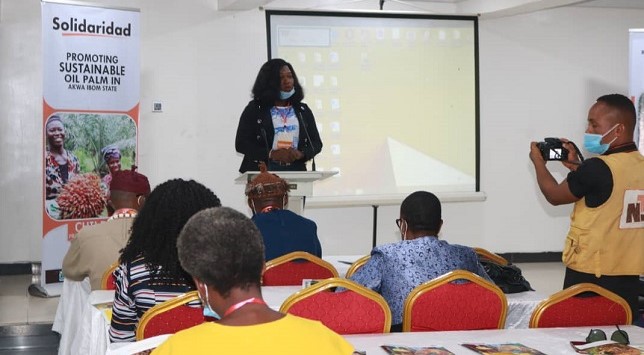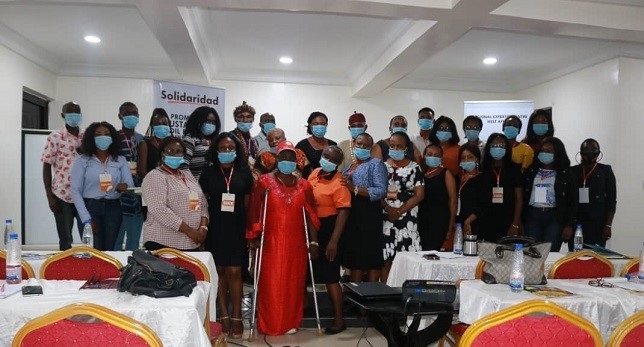Solidaridad West Africa has advocated the need for empowerment, sensitisation and extension of land inheritance to enable women take active part in oil palm business.

The Netherlands-based international non-governmental organisation has also discouraged child labour, abuse and trafficking in the process of their involvement in the oil palm business.
At a stakeholders’ engagement forum for policymakers in Uyo, the Akwa Ibom State capital, on Tuesday, December 1, 2020 as part of the organisation’s project, the National Initiatives for Sustainable and Climate-Smart Oil Palm Smallholders (NISCOPS) campaign, Solidaridad declared that oil palm business is a more dependable income earner than crude oil.
Justifying the essence of the stakeholders engagement, Mrs Priscilla Affiah-Udoh of Climate Change Network Nigeria, one of the CSOs working with Solidaridad West Africa, says the forum was designed to make policies that will equip the women with needed intellectual resources to take active part and benefit from the value chain of oil palm.
The forum, which featured sessions of intellectual fireworks on promotion of women and protection of children was, according to her, meant to achieve gender inclusion.
“Women have to be part and parcel of the value chain from beginning to the end and promoted to have equal opportunity and also protect children while doing this,” she said.
Affiah-Udoh noted that the current practice around palm business is not giving yield, therefore making the business unattractive and created the need for the NGO’s intervention to promote the production, extraction and sales of oil palm products.
“Solidaridad is standing in the gap to make sure that small holder farmers have access to a round table on sustainable oil palm certification which is the only platform for exportation of oil palm product to make sure that the oil is good for human consumption and for industrial use. That would change the livelihood of small holder farmer and change their economic status.”
Also addressing the forum, Florence Bassey of Justice Development and Peace Commission, another CSO working with Solidaridad, said that, to encourage a gradual shift from the conventional Dura specie of palm fruit which is considered unsuitable for the global market, to the recommended Tennerra, the NGO has been in several Akwa Ibom communities to identify critical stakeholders and form groups to cultivate interest.
Her words: “We grouped farmers in Ika, Abak, Etim Ekpo, Ikot Ekpene, Okobo, Essien Udim, Uruan, Nsit Atai and Ibesikp Asutan Local Government Areas of Akwa Ibom State because community facilitators were trained in these areas to start up the project as we spread to others in the state.
“We have done community sensitisation on climate change adaptation and mitigation; we had a huge number of community people coming out to learn on how to grow oil palm.
“We have also sensitised people on how to go into short term cultivation of crops while waiting for the oil palm to begin fruiting atter three years. This is to enable you have income to sustain you while you wait. There is so much in the oil palm; in fact, it is the next oil well,” she said.

Dr Edna Akpan, an Associate Professor in the Department of Crop Science, Akwa Ibom State University, Vice Dean Faculty of Agriculture and the South-South coordinator of Harvest Plus, on her part charged Akwa Ibom women to desist from running around politicians but to take active part in agribusiness for a decent living.
“Women make and form more than 80 percent of useful workforce in agriculture and they could make a living from there. They need some mindset reorientation to go back to the basics. There is money and a lot of untapped potential in agriculture,” she said.
The stakeholders engagement forum which focuses on promotion of women and protection of children in oil palm business also recommended easy access to loan, provision of processing mills at subsidised rate, reorientation of men on land ownership and laws to protect the right of widows.
It further recommended introduction of palm plantation, processing and extraction in schools curriculum, protection of children from becoming school dropouts, protection against hazards associated with palm production, and ensuring a risk-free knowledge transfer to children, among others.
